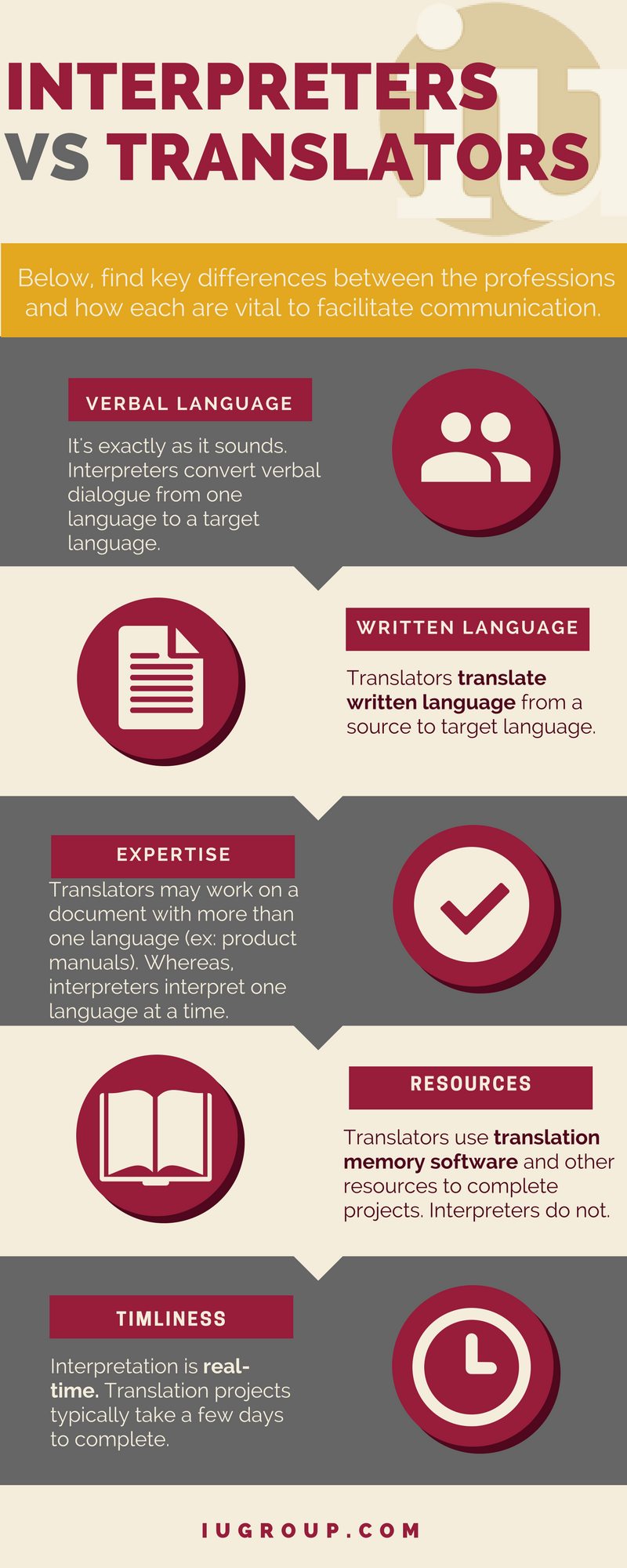Defining Translation And Interpretation

We desired to take a moment to discuss the distinction between language translation and also interpretation, in addition to address some other typical concerns. Language translation is the procedure of transforming the written word from one language into one more language in such a way that is culturally and also linguistically appropriate so it can be understood by its desired audience.
An interpreter's work is to help with communication between 2 people that speak various languages, whether the conversation happens over the phone, personally, or using video clip remote translating. Language translators as well as interpreters share much of the very same skill sets. Both must excel in a minimum of two languages as well as have a good understanding of the societies for the desired target market, whether they will certainly read or listening to the words.
Interpreters Vs. Translators
As an example, many interpreters and translators have extra training in the clinical, legal, or business fields, which allows them to be skilled at their jobs. Interpreters likewise require some specific abilities, such as: Phenomenal paying attention skills and also memory recall in order to bear in mind words and also convert them from one language to an additional in actual time, Capacity to take great notes Excellent interaction as well as customer support abilities, Exceptional comprehension of syntax along with grammar. Details abilities for translators include: Capacity to research words as well as principles, Outstanding composition as well as grammar skills in both languages. A bilingual individual is a person who excels in a minimum of 2 languages.
Interpreters as well as translators need additional skills, consisting of those stated above, to be reliable at their work. Being a professional additionally implies an interpreter's or translator's abilities have been examined using language efficiency examinations, in addition to industry-specific tests. Supplying language services to satisfy the requirements of your target market is no more optional.
Professional Translation Vs. Interpretation: Differences
But with countless translation and also interpretation remedies to pick from, exactly how can you be certain you're selecting the right one? Begin by looking at just how a potential supplier employs and trains its translators as well as interpreters. It's also vital to inquire about their procedures for making sure quality and also safeguarding your info, in addition to their technological capacities and also how they reply to sustain demands.
What's The Difference Between Translation And Interpretation
While linguistic as well as cultural abilities are crucial, one of the most crucial high quality a great translator have to have is the ability to write well in the target language. Competent translators have to have the capacity to comprehend the resource language and the society of the nation where the message came from, then utilizing an excellent library of dictionaries and recommendation products, to render that material plainly and precisely right into the target language.
Interpretation And Translation: Same Or Different?
Recognizing this restriction, a great translator will just equate files right into his/her native language. When selecting a translator it is important to firmly insist that the translator only equate right into their indigenous language and also into an area of their subject issue expertise.Interpreting is anoral form of translation, allowing real-time cross-linguistic communication either in person, in a meeting setup or over the phone. This is the procedure where a person repeats.
Translating, similar to translation, is basically paraphrasing; the interpreter pays attention to an audio speaker in one language, realizes the content of what is being said, and afterwards rewords his or her understanding of the meaning using the tools of the target language. An interpreter needs to be able to convert in both directions.
Difference Between Translation And Interpretation
Equally as you can not clarify to somebody a believed if you did not completely comprehend it, neither can you convert or analyze something without proficiency of the subject matter being passed on. This requires a high degree of proficiency in a discipline, existing expertise.
When choosing an interpreter, professional expertise of the topic is equally as important as analyzing experience. Interpreters should have remarkable paying attention capacities. It is essential to note that not all languages have a direct translation-to-interpreting correlation.
Interpreters Vs. Translators
Some spoken or spoken languages have no written language, for instance American Indicator Language, Pirah as well as lots of native American languages. Better, some dialects share the same written language. For instance many individuals mistakenly describe Chinese to indicate both a certain spoken and composed language. A producing business may employ translators to convert their individual guide or training manual for a certain product right into several languages, allow's claim German, Oriental and also French. Nonetheless, when audio speakers of those languages hire to the customer care center and also wish to discuss the products in their indigenous language, then interpreters would be used to assist in the conversation. However, when a Spanish speaker dials right into an English-speaking phone call facility, they would certainly require an interpreter to review getting.
Interpreting and translation are two carefully related etymological self-controls. Yet they are rarely done by the very same people. The difference in abilities, training, ability as well as even language knowledge are so substantial that few individuals can do both efficiently on a professional degree. On the surface area, the distinction in between interpreting as well as translation is just the difference in the tool: the interpreter equates by mouth, while a translator translates created message.
